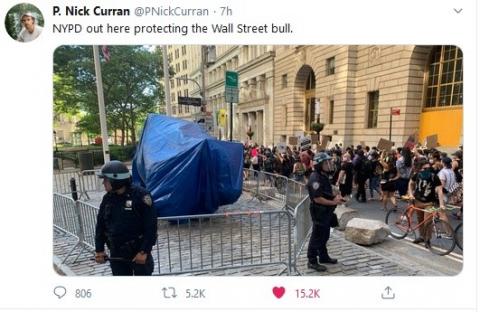
There are two common misconceptions about the stock market that always baffled me.
The first one is that the stock market evolution is a good indicator of the underlying economy.
If anything, those last weeks and months with Covid19 have proven that logic clearly wrong. On April 10th, with never seen new unemployment figures in the USA following the lock downs, the stock market had its record performance week since 1938.

Alexandria Ocasio-Cortez noted, this is when late stage capitalism takes a selfie on TV, showing two trends we believed should be in sync but clearly are not.
As the Dow's registered its best week since 1938, an additional 16.000.000 US citizens lost their jobs.
Granted, the stock market hit a speed bump and went somewhat down prior to that exact moment, but you cannot declare that the stock market ‘crashed’ because of the worldwide corona-crisis. Some rich and powerful among us even became a lot richer.
I am aware that as I am writing this today, June 14th, the moment of reckoning could be soon.
More and more analysts are now worried about a second wave of infections, with its negative impact on earnings, EBITDA’s, shareholder values and other financial KPIs (and by the way on the life conditions of large portions of the public too). The biggest drop ever in the Dow Jones Index, not starting at 36.000 but at 25.605,54, might be something we will experience over the next months. Who knows?
The second misconception is that everybody wins and loses equally by having money on the stock market.
A 2017 study by Edward N. Wolff of the National Bureau of Economic Research suggests otherwise.
“The overall stock ownership rate (either directly or indirectly through mutual funds, trust funds, or pension plans)… rebounded to 49 percent in 2016…”.
So, while indeed almost half of the people own some stock today, directly or indirectly, who profited most of the raising stock prices over the last decades?
“Over 90 percent of the total value of stock shares, bonds, and business equity, and 85 percent of non-home real estate were held by the top 10 percent of households.”
“The top 1 percent of households classified by wealth owned 40 percent of all stocks in 2016, the top 10 percent 84 percent, and the top [20%] [owns] 93 percent.”
It would thus be bizarre, to say the least, that government should step in should we face a huge worldwide decrease in stock prices, with large losses for the investors.
Let us not forget that the stock market is a closed environment by its structure; if somebody wins on a transaction, somebody else loses, and vice-versa. Obviously, if you were to hold on to your portfolio and not perform any sale transaction, you will see its value evaporate away during a bear market.
The act of offering government support to those that would lose on a possible falling stock market in the upcoming months, the top 20% that owns 93 percent of all stocks, falls squarely into the category of privatizing the benefits and socializing the losses.
There are other targets of government assistance in my eyes that appear to be so much more meaningful, more humane. In a non-exhaustive way, these targets include financial support for the unemployed, for those who lost their healthcare insurance as a result, for the poor, for small mom-and-pop stores that are on their way to bankruptcy as well as struggling SMEs.
Our "new normal" deserves it.
Reference: http://www.nber.org/papers/w24085